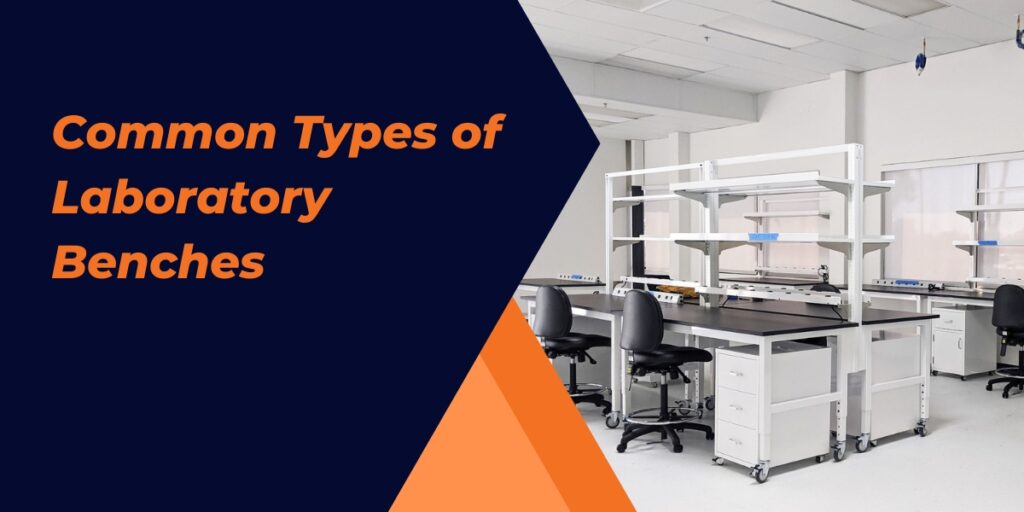Different Types of Laboratory Benches
Every piece of equipment and furniture has a specific function in a laboratory. That is why considering lab benches that suit various laboratory needs and research activities is important when planning your workspace.
Some laboratory benches are designed for specific tasks like weighing or measuring, while others can be versatile and used for different tasks.
Choosing an appropriate bench for a given task is crucial to ensure accurate results and discomfort for the worker.
Now, let us learn about different types of laboratory benches.
Overview of Lab Benches Types
There are many types of lab benches, each with its specific features and benefits, including:
- Traditional laboratory bench: It is a strong, weighty furniture piece used for scientific experiments. It has a work surface, storage, and a comfy seat.
- Workstation bench: Workstation bench are smaller and more versatile than traditional laboratory benches, designed for a single user with limited storage space but can accommodate various equipment and supplies.
- Lab tables: Lab tables are smaller, compact, and versatile, designed for small-scale experiments with limited storage space, but can accommodate various equipment and supplies.

8 Most Common Types of Lab Benches
1. Epoxy Resin
The Epoxy resin consists of a combination of different materials. It is transformed into a solid benchtop for the laboratory. With endless color options, it provides durability and aesthetics to your lab.
Chemicals, ultraviolet light, and shock do not affect a high-quality epoxy benchtop. This enhances its longevity. Moreover, it is an antimicrobial benchtop.
Make sure you buy epoxy laboratory benches from a quality supplier. In low-quality benchtops, air bubbles can be trapped in the resin, or other surface imperfections can be there.
Another factor to consider is how prone the material is to getting scratched and stained. Although it is possible to remove these marks, these countertops necessitate additional upkeep to prevent any undesirable appearance-related problems.
2. Phenolic Resin
Phenolic resin is much similar to epoxy. However, its lower price point sets it apart. It fulfills all epoxy lab requirements, including a seamless finish and chemical, bacteria, and fungus resistance.
But it comes with less durability. So, it is better if these benchtops are used for simpler, lighter lab activities. If your laboratory involves heavy-duty activities, epoxy resin will be a better alternative.
3. Stainless Steel
Known for its longevity, stainless steel can withstand highly intense impacts and heat. You can maintain a sleek and shiny finish for your work with the right maintenance practices.
In contrast to other materials, stainless steel is easy to maintain. Moreover, it hardly demands any replacements. It can withstand heavy wear and tear without getting dented.
In addition, it is also resistant to heat, moisture, and chemicals. It has a smooth surface which allows easy sterilizing. However, metal benchtops are highly inductive, making them unsuitable for certain laboratories.
4. Maple Wood
Maple wood is another aesthetic material for lab benches. This wood is affordable and exceptionally durable, ranking at a Janka hardness test score of 1450, making it one of the toughest woods on the market within its price range.
Wood laboratory benches are smooth and available in multiple styles. Unlike steel, they are not conductive, making them a good option for certain workspaces.
Although this bench material is prone to be burned, scratched, and dented, it remains suitable for numerous laboratory environments, and maple wood can provide several years of reliable service.
5. High-density Polyethylene Sheets
High-density polyethylene is a commonly used plastic around the world. It can be found in milk jugs, pipes, and playground equipment. It is strong, durable, and also easy to clean.
These laboratory benches are cost-effective and resistant to mold and fungus. However, it is a softer material that can get damaged when exposed to heat, chemicals, and even moisture.
This affordable lab bench material could be advantageous if your laboratory doesn\’t require excessive heat or corrosive chemicals.
6. Electrostatic Discharge (ESD) Workbench
These workbenches are specifically designed to prevent electrostatic discharge. Static electricity can not harm humans. However, it can damage electronic products and cause fires or explosions.
Instead of allowing the passage of electricity, this type of bench channels static electricity towards the earth. Such laboratory workbenches are crucial in electronics laboratories.
These lab benches become indispensable if you engage in tasks involving circuits or other electronic devices.
7. Wilsonart Solid Surface
Wilsonart-engineered surfaces offer an appealing and durable choice for your laboratory workbenches. The benchtops made of solid surfaces are composed of acrylic and possess resistance against moisture and bacteria.
Moreover, this non-porous material can also withstand stains, simplifying the cleaning and maintenance process.
Wilsonart is a well-known name in the field of home decoration. However, the company not only specializes in creating home decor products but also manufactures laboratory surfaces specifically designed to be used in laboratories.
These surfaces are built to endure the effects of harsh chemicals, such as cleaners. They are also engineered to mimic various other surfaces like quartz and marble.
Although the acrylic material used on these surfaces is highly durable, it can also be repaired in case of any damage.
8. High-Pressure Laminate
It is a type of plastic laminate durable enough for most lab activities. It comprises multiple layers of paper that have been impregnated with phenolic resin.
Each benchtop is bonded together by applying intense pressure and heat, a technique known as thermosetting. As a result, they become robust and capable of withstanding fire and regular usage without significant damage.
This substance has versatile applications, including shelves, tabletops, and more. It is readily available at various laboratory supplies companies.
High-pressure laminate is a durable, versatile material for lab use, resistant to chemicals, fire, and more, with some types even dissipating electrostatic discharge.
Conclusion
In conclusion, you can find numerous lab benches that are long-lasting and adaptable. When shopping for one, it\’s important to think about the specific tasks performed in your laboratory, the level of durability needed, and, of course, your budget.
In addition to our pre-made benches, we offer the option to create customized benches based on your requirements. Contact us today for further information about our personalized laboratory benches!
FAQs
1. What are the sizes of laboratory workbenches?
Most workbenches usually have widths between 24 and 36 inches, depths ranging from 30 to 120 inches, and heights spanning from 30 to 36 inches. The size of the bench is determined by the amount of space accessible in your lab.
2. What are the various uses of laboratory benches?
Lab benches store chemicals, glassware, and lab equipment, providing a durable, stain-resistant surface. They\’re used in schools, labs, research facilities, and hospitals.




